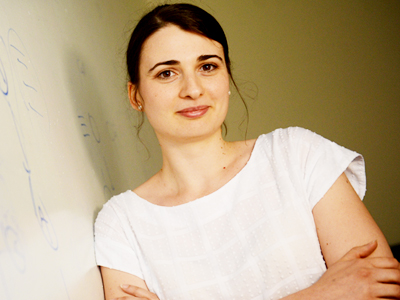Professor Roxana Geambasu Scores a Brilliant 10
Roxana Geambasu, assistant professor of computer science, has been named one of Popular Science’s Brilliant Ten, the magazine’s 13th annual list of the “brightest young minds in science and engineering.” Noting that these top 10 researchers are already changing the world, Popular Science cites Geambasu for her research that “teaches the cloud to forget personal data” and builds “software that allows the public to see where the information they share goes.”

Roxana Geambasu
“It is very exciting and humbling to get this honor,” says Geambasu. “I am flattered to be included in such an inspiring group.”
Geambasu’s work is focused on ensuring data security and privacy in an era of cloud computing and ubiquitous mobile devices, all technologies upon which billions of users rely to access and host sensitive data—emails, documents, financial information, etc.—and which have become easy targets for theft, espionage, hacking, and legal attacks. As she has pointed out, the mobile devices we carry with us everywhere are packed with confidential information under operating systems that never securely erase data. And at the other end, cloud services not only accumulate endless logs of user activity, such as searches, site visits, and locations, but also keep them for extended periods of time, mine them for business value, and at times share them with others—all without the user’s knowledge or control.
Geambasu notes that this has become an untenable state and is working to identify the security and privacy risks inherent in current mobile and web technology and designs, and constructing systems to address those problems. Her research spans broad areas of systems research, including cloud and mobile computing, operating systems, and databases, all with a focus on security and privacy. She integrates cryptography, distributed systems, database principles, and operating systems techniques and works collaboratively in developing cross-field ideas in order to solve today’s data privacy issues.
Professors Geambasu and Chaintreau talk about XRay, their new tool to make use of online personal data more transparent.
“My research aims to forge a new, more privacy-conscious future where users are better aware of the implications of their online actions and Web services and applications are built with users' privacy in mind,” Geambasu adds.
She is the second professor at the School to make the magazine’s annual list. In 2011, fellow Computer Science Associate Professor Eitan Grinspun was named to the Brilliant 10.
Geambasu, who joined Columbia Engineering in 2011, has won a number of awards, including a prestigious Microsoft Research Faculty Fellowship and an NSF CAREER award, both in 2014, and the first Google Fellowship in Cloud Computing in 2009. She received her BS from Polytechnic University of Bucharest (Romania) in 2005; her MS (2007) and PhD (2011) from the University of Washington.
In order to arrive at the Brilliant Ten, Popular Science combs through hundreds of nominations from around the country and vets the most promising candidates with experts working in those fields.
“Popular Science has always looked optimistically towards the future, and there’s no more promising sign of what that future will bring than the inspired work of young scientists and engineers across the country,” says Editor-in-Chief Cliff Ransom. “The Brilliant Ten is a celebration of the best and brightest.”
